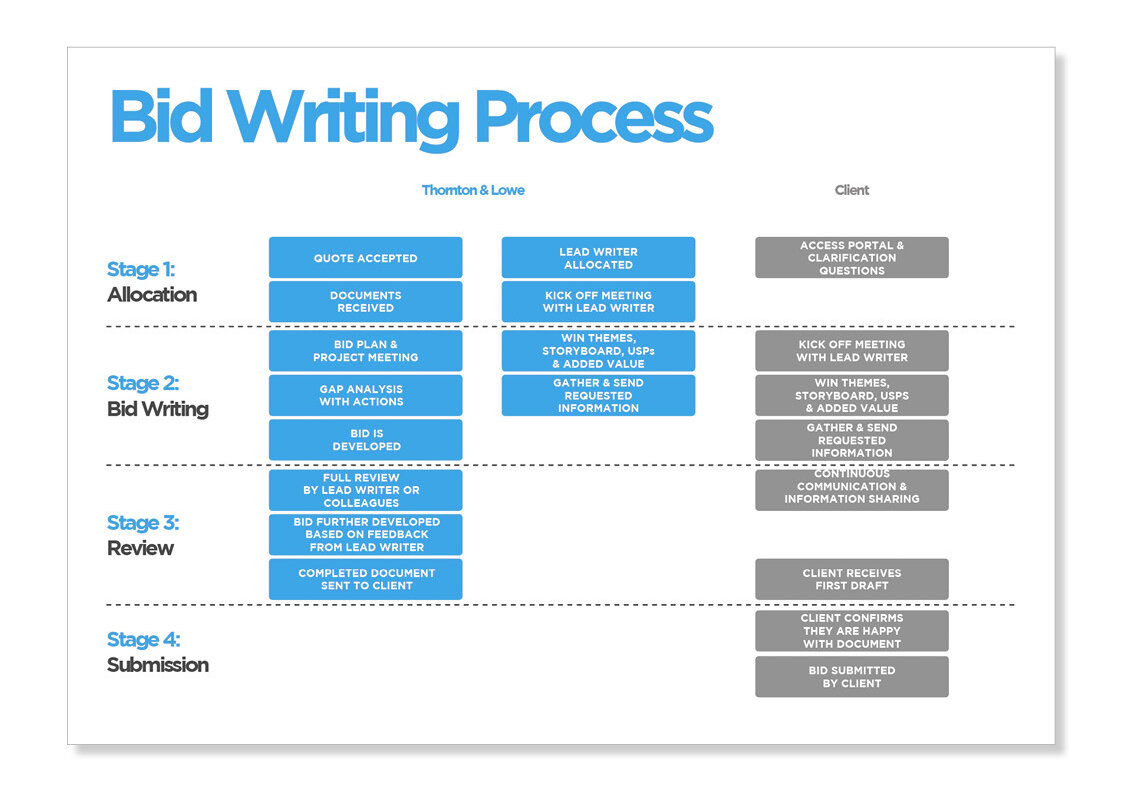Tender Improvements & Continuous Improvement
How do you work on improving your tenders? At Thornton & Lowe, we have a strong ethos on continuous improvement and will always look at new ways to develop and improve our writing.
We often work with clients providing guidance on how they can improve their tender responses. We assess bid strategy, processes, capacity and expertise, as well as the tender structure, ensuring all of the question is answered, adding value and with clear win themes. As well as your use of supporting evidence and documents. This forms part of our bid review and wider bid writing services.
Changes to Bid Management Processes
Your tendering process is key to consistent high performing bids! To make tender improvements, companies should focus on refining their bid management processes, as well as the content of your bid. This involves targeting tenders that align with business goals, enhancing process efficiency, and establishing a centralised repository for tender content, a bid library. Engaging subject matter experts and ensuring information accuracy are critical. Regularly testing and scoring tender responses, reviewing past results, and getting a third party assessment of your bid quality, will ensure your win rate keeps improving.
Improving your tender response scores also provides an opportunity to refine your pricing strategy.

Tender Improvements
10 ways to improve your tender responses and win more contracts
1. Targeted tender selection. Focus on bids that align with your business strengths and objectives. Understanding the requirements and the buyer’s needs increases the chances of a successful bid. This should form part of your bid planning activities.
2. Centralised content management. Develop a repository of pre-written content and bid templates. This ensures consistency and saves time, allowing you to quickly tailor responses to specific tenders.
3. Expert involvement. Involve subject matter experts in the preparation of your bids. Their insights and technical knowledge can significantly enhance the quality and relevance of your responses. The bid is more practical and comes to life!
4. Thorough documentation review. Carefully read and understand all tender documents. Address each requirement and question in your response to ensure compliance and relevance. Collating the specification and wider requirements, and assigning key elements to each relevant tender question.
5. Process efficiency. Streamline your tendering process to ensure you have the maximise amount of added value time on the bid. This becomes part of your bid strategy.
6. Regular testing and scoring. Implement a system for regularly testing and scoring your tender responses. Use feedback from these tests to make continuous improvements.
7. Review past bids. Analyse previous tender responses, especially the unsuccessful ones, to identify areas for improvement. Learning from past mistakes can prevent them in future bids.
8. Use of support tools. Use bid software to organise and manage your bids efficiently.
9. Client feedback and tender improvement workshops. Gather feedback from clients and hold workshops to improve your team’s skills in bid writing. Understanding client perspectives can help you tailor your responses more effectively.
10. Continuous Improvement. Regularly update and refine your tendering processes. Stay informed about best practices and industry standards to keep your responses competitive.
See our Ultimate Guide to Bid Writing, for more information.
Need tender improvements now?
Contact us todayNeed Tender Improvement Support?
Continual tender improvements are key if you are going to consistently develop winning bids. Businesses can improve their tender responses, making them more compelling and increasing their chances of winning contracts. This approach not only improves the quality of each submission but also builds a foundation for long-term success in tendering.
If you would like us to review and provide feedback on a live or previously submitted pre-qualification questionnaires or ITT, give us a ring on 01204 238046. Or email hello@thorntonandlowe.com
Tender Improvement Training
Bid writing course are designed to help you and your business make tender improvements and win more contacts. Our bid writing training covers both bidding process and creating and improving specific quality responses.

Improve Your Tender Responses & Bid Writing in 4 Weeks
If you want to improve your public sector tender success rates, there are several key steps you can take. First, focus on understanding the buyer by researching their objectives and attending briefing events. Next, prepare a quality bid by carefully analysing the tender documents and creating a practical bid strategy. When writing your tender response, use clear language, provide evidence of your capabilities, and demonstrate value for money. Building relationships with buyers and continuously seeking feedback can also help you improve your win rates.
Finally, show your expertise by highlighting relevant case studies and emphasising your unique selling points, while ensuring compliance with all mandatory requirements.
To help you put these steps into action, here's a detailed table that incorporates elements from the "How to overhaul your bid writing in just 4 weeks":
Step | Actions | Timeframe |
|---|---|---|
1. Understanding the buyer | - Conduct a SWOT analysis to identify your strengths and weaknesses | Week 1 |
2. Preparing a strong bid | - Carefully read and analyse the tender documents | Week 2 |
3. Writing a winning tender response | - Use clear, concise language and avoid jargon | Week 3 |
4. Building relationships | - Engage with the buyer before the tender is released | Week 4 |
5. Showcasing your expertise | - Highlight relevant case studies and testimonials | Ongoing |
6. Ensuring compliance | - Meet all mandatory requirements and deadlines | Ongoing |





